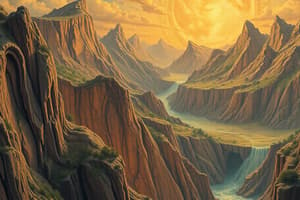Podcast
Questions and Answers
What process led to the formation of Earth from a giant molecular cloud?
What process led to the formation of Earth from a giant molecular cloud?
- Chemical reactions between gases
- Collision of dust particles (correct)
- Freezing of liquid droplets
- Eruption of volcanic materials
Approximately how long ago did the solar system originate from a giant molecular cloud?
Approximately how long ago did the solar system originate from a giant molecular cloud?
- 2.6 billion years ago
- 6.6 billion years ago
- 8.6 billion years ago
- 4.6 billion years ago (correct)
Which supercontinent existed around 750 million years ago before the landmasses started drifting apart?
Which supercontinent existed around 750 million years ago before the landmasses started drifting apart?
- Gondwana
- Pangaea (correct)
- Laurasia
- Rodinia
What geological phenomenon caused the movement of Earth's continents over time?
What geological phenomenon caused the movement of Earth's continents over time?
How is plate tectonics related to continental drift?
How is plate tectonics related to continental drift?
What are the three main types of plate boundary movements discussed in the text?
What are the three main types of plate boundary movements discussed in the text?
During its early stages, what were some of the gases present in the Earth's atmosphere?
During its early stages, what were some of the gases present in the Earth's atmosphere?
What led to the transition from anoxic conditions to an oxidizing atmosphere in Earth's history?
What led to the transition from anoxic conditions to an oxidizing atmosphere in Earth's history?
How did plate motions influence climate patterns on Earth?
How did plate motions influence climate patterns on Earth?
What factor contributed to the incorporation of additional elements into Earth's atmosphere over time?
What factor contributed to the incorporation of additional elements into Earth's atmosphere over time?
Which event is essential in understanding the origins and evolution of Earth according to the text?
Which event is essential in understanding the origins and evolution of Earth according to the text?
Flashcards are hidden until you start studying
Study Notes
Origin and Evolution of Our Planet
Earth is more than just our home; it's a complex world with a fascinating history spanning billions of years. To understand the present state of our planet, let's delve into its origin and follow its journey through time, exploring key aspects such as the formation of Earth, continental drift, plate tectonics, and the development of its atmosphere.
Formation of Earth
Approximately 4.6 billion years ago, our solar system was born from the gravitational collapse of a giant molecular cloud. As this cloud contracted, dust particles collided, forming larger clumps. Eventually, one massive object emerged, becoming Jupiter-sized and eventually solidifying into what we know today as Earth. This process involved millions of years of heat, pressure, and chemical interactions between different materials inside the nebula.
Continental Drift
Around 750 million years ago, Earth began moving towards the continents we recognize today. Although initially lumped together in a supercontinent named Pangaea, the landmasses slowly started drifting apart due to shifting ocean floors. This phenomenon, known as continental drift, has led to numerous changes over geological timescales, including the creation of new oceans and rearranging mountain ranges.
Plate Tectonics
Continental drift is closely linked to plate tectonics, which describes how Earth's crust moves continuously around a semi-rigid mantle layer below. There are seven large plates covering most of the surface, along with several smaller ones. These plates interact with each other mainly through three types of boundary movements: divergent plate boundaries (where two plates move away from each other), convergent plate boundaries (two plates meet causing collision or divergence), and transform faults (sliding past one another).
Plate motions have played vital roles throughout Earth's history, shaping landscapes, contributing to volcanic eruptions, influencing climate patterns, and creating habitats suitable for life as we know it.
Early Atmosphere
The atmosphere evolved gradually during Earth's lifetime, starting as a combination of volatile compounds released by cooling magma after the initial formation of the planet. During this primordial stage, the atmosphere contained mostly carbon dioxide, water vapor, nitrogen, methane, ammonia, hydrogen sulfide, and various gases like helium and argon. Over time, additional elements were incorporated thanks to processes such as outgassing from volcanoes and weathering of rock surfaces.
As photosynthetic organisms began appearing on our planet approximately 3.8 billion years ago, oxygen accumulated within the environment, leading to a transition from anoxic conditions to an oxidizing atmosphere. While these microorganisms initially created a toxic mix containing both oxygen and sulfur, known as SO2, green algae and cyanobacteria soon dominated, producing free oxygen.
Today, our atmospheric composition consists primarily of nitrogen, oxygen, and trace amounts of other gases, providing the perfect balance essential for sustaining life forms on Earth.
In summary, understanding the origins and evolution of our planet requires us to examine the interplay among numerous factors, from the cataclysmic events during birth to the gradual development of Earth's unique features—the very foundation upon which all life thrives.
Studying That Suits You
Use AI to generate personalized quizzes and flashcards to suit your learning preferences.




